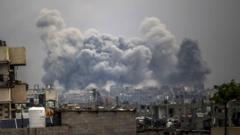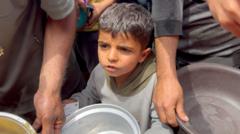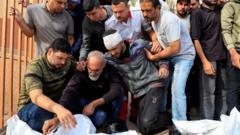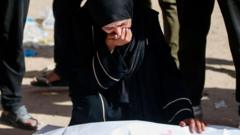The operation aims to defeat Hamas, secure hostages, and maintain control over strategic areas of the Gaza Strip.
**Israel's Major Offensive Against Hamas: Operation Gideon's Chariots Underway**

**Israel's Major Offensive Against Hamas: Operation Gideon's Chariots Underway**
Israeli Defense Forces ramp up military actions in Gaza amidst humanitarian crisis concerns.
In a significant escalation of its military efforts, Israel has launched "Operation Gideon's Chariots," a major offensive targeting Hamas as the Israeli Defense Forces (IDF) strategically mobilize troops across the Gaza Strip. Announced via their Hebrew X account, the operation focuses on defeating Hamas while safeguarding the lives of hostages still held by the militant group.
In recent days, reports from the Hamas-run civil defense and health ministry indicate that Israeli bombardments have resulted in the deaths of approximately 250 individuals since Thursday. Critics of the operation highlight the dire humanitarian conditions facing the population, exacerbated by an ongoing blockade imposed by Israel since March following the collapse of a two-month ceasefire.
U.S. President Donald Trump, while in the Middle East, characterized the conditions in Gaza as dire, stating, "a lot of people were starving." However, discrepancies exist, as the Israeli military has not made mention of the operational name in its English-language communications. Acknowledgment of the extensive military strikes—over 150 targets have been hit in just 24 hours—suggests a commitment to continue until Hamas is fully neutralized and all hostages are released.
The Times of Israel reports that the IDF's strategy involving "Gideon's Chariots," named after a biblical figure known for strong military leadership, encompasses taking and controlling territory. Israeli officials aim to facilitate the relocation of civilians to safer areas while disrupting Hamas's control over essential aid supplies.
As Israel intensifies its aggression, international calls for a ceasefire have been ignored, prompting concerns of war crimes. UN Human Rights Chief Volker Türk expressed apprehension that Israel's actions could potentially violate international law, describing the systematic destruction of neighborhoods and the constraints on humanitarian aid as indicative of ethnic cleansing.
In the medical community, dire reports come from front-line workers. Victoria Rose, a British reconstructive surgeon at Nasser Hospital in Khan Younis, described the profound exhaustion of her team amidst overwhelming patient needs. She noted the alarming health condition of children, many suffering from malnutrition, severe burn injuries, and infections due to inadequate healthcare access.
A UN assessment recently labeled the situation in Gaza critical, warning of imminent famine risks among its beleaguered population. Despite these findings, the Israeli government has consistently dismissed accusations of a food crisis in the region.
The military action by Israel was formally launched in the wake of a violent attack by Hamas on October 7, 2023, which resulted in the tragic loss of around 1,200 lives and subsequent hostage situations, further complicating an already volatile conflict in the region.
In recent days, reports from the Hamas-run civil defense and health ministry indicate that Israeli bombardments have resulted in the deaths of approximately 250 individuals since Thursday. Critics of the operation highlight the dire humanitarian conditions facing the population, exacerbated by an ongoing blockade imposed by Israel since March following the collapse of a two-month ceasefire.
U.S. President Donald Trump, while in the Middle East, characterized the conditions in Gaza as dire, stating, "a lot of people were starving." However, discrepancies exist, as the Israeli military has not made mention of the operational name in its English-language communications. Acknowledgment of the extensive military strikes—over 150 targets have been hit in just 24 hours—suggests a commitment to continue until Hamas is fully neutralized and all hostages are released.
The Times of Israel reports that the IDF's strategy involving "Gideon's Chariots," named after a biblical figure known for strong military leadership, encompasses taking and controlling territory. Israeli officials aim to facilitate the relocation of civilians to safer areas while disrupting Hamas's control over essential aid supplies.
As Israel intensifies its aggression, international calls for a ceasefire have been ignored, prompting concerns of war crimes. UN Human Rights Chief Volker Türk expressed apprehension that Israel's actions could potentially violate international law, describing the systematic destruction of neighborhoods and the constraints on humanitarian aid as indicative of ethnic cleansing.
In the medical community, dire reports come from front-line workers. Victoria Rose, a British reconstructive surgeon at Nasser Hospital in Khan Younis, described the profound exhaustion of her team amidst overwhelming patient needs. She noted the alarming health condition of children, many suffering from malnutrition, severe burn injuries, and infections due to inadequate healthcare access.
A UN assessment recently labeled the situation in Gaza critical, warning of imminent famine risks among its beleaguered population. Despite these findings, the Israeli government has consistently dismissed accusations of a food crisis in the region.
The military action by Israel was formally launched in the wake of a violent attack by Hamas on October 7, 2023, which resulted in the tragic loss of around 1,200 lives and subsequent hostage situations, further complicating an already volatile conflict in the region.




















